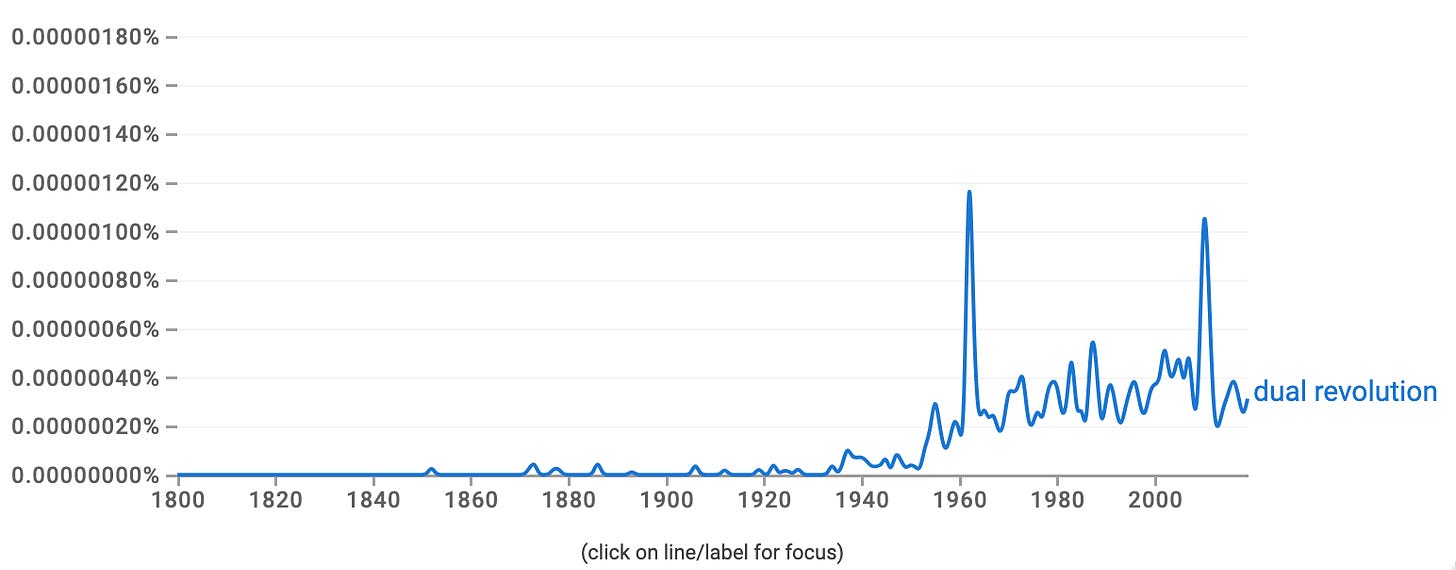READING: Eric Hobsbawm in 1962 on þe "Dual Revolution", 1789-1848
It is owing to Eric Hobsbawm þt we think of þe Democratic Revolution & þe Industrial Revolution as one thing—a Dual Revolution extending over 1789-1848 (or perhaps 1775-1870). But if Eric had been...
…a more clearsighted Marxist he would have put it differently—he would have seen a transformation from a feudal to an imperial-commercial mode of production between 1000 and 1600, followed by a transformation from a feudal to a bourgeois mode of domination starting around 1400 and still incomplete in 1800. & starting around 1700 we had the start of a transformation to a steampower mode of production, which would—whenever þe last instance would deign to arrive—see a transformation from a bourgeois mode of domination to full socialism. In such a framework þe discussion of democracy—of social technologies of representation, communication, organization, debate, & state-level decision, policy implementation, & social management—could have been much richer þan þe discussion Hobsbawm managed to provide…
Eric Hobsbawm (1962): The Age of Revolution: 1789-1848 <https://www.amazon.com/dp/0679772537>: Introduction
The profundity of the revolution which broke out between 1789 and 1848, and [which] forms the greatest transformation in human history since the remote times when men invented agriculture and metallurgy, writing, the city and the state. This revolution has transformed, and continues to transform, the entire world. But in considering it we must distinguish carefully between its long-range results… and its early and decisive phase, which was closely tied to a specific social and international situation… the triumph not of ‘industry’ as such, but of capitalist industry; not of liberty and equality in general but of middle class or ‘bourgeois’ liberal society; not of “the modern economy” or “the modern state”, but of the economies and states in a particular geographical region of the world (part of Europe and a few patches of North America), whose centre was the neighbouring and rival states of Great Britain and France. The transformation of 1789-1848 is essentially the twin upheaval which took place in those two countries, and was propagated thence across the entire world.
But it is not unreasonable to regard this dual revolution—the rather more political French and the industrial (British) revolution—not so much as something which belongs to the history of the two countries… but as the twin crater of a rather larger regional volcano… that… could not with any probability have been expected to occur at this time in any other part of the world. It is equally relevant to note that they are at this period almost inconceivable in any form other than the triumph of a bourgeois-liberal capitalism.
It is evident that so profound a transformation cannot be understood without going back very much further in history than 1789, or even than the decades which immediately preceded it and clearly reflect (at least in retrospect), the crisis of the ancien régimes of the North-western world, which the dual revolution was to sweep away….
And yet the history of the dual revolution is not merely one of the triumph ofthe new bourgeois society. It is also the history of the emergence of the forces which were, within a century of 1848, to have turned expansion into contraction. What is more, by 1848 this extraordinary future reversal of fortunes was already to some extent visible…. If we look round the world of the 1960s we shall not be tempted to underestimate the historic force of the revolutionary socialist and communist ideology born out of reaction against the dual revolution, and which had by 1848 found its first classic formulation. The historic period which begins with the construction of the first factory system of the modern world in Lancashire and the French Revolution of 1789 ends with the construction of its first railway network and the publication of the Communist Manifesto…
To my knowledge, the first person to use the phrase “dual revolution” in Hobsbawm’s sense was:
T. Edwin Brown (1886): Studies in Modern Socialism & Labor Problems <https://www.google.com/qRUNAAAAYAAJ>: ‘Historic providence… has speeded a dual revolution, industrial and social, which, while transforming the domestic system of labor into the factory system of labor, was also transforming a serf into a free citizen…







Something along the lines of For economics England for politics France was definitely written by Marx and Engels. They did not note that this dichotomy proves that their central thesis is incorrect.